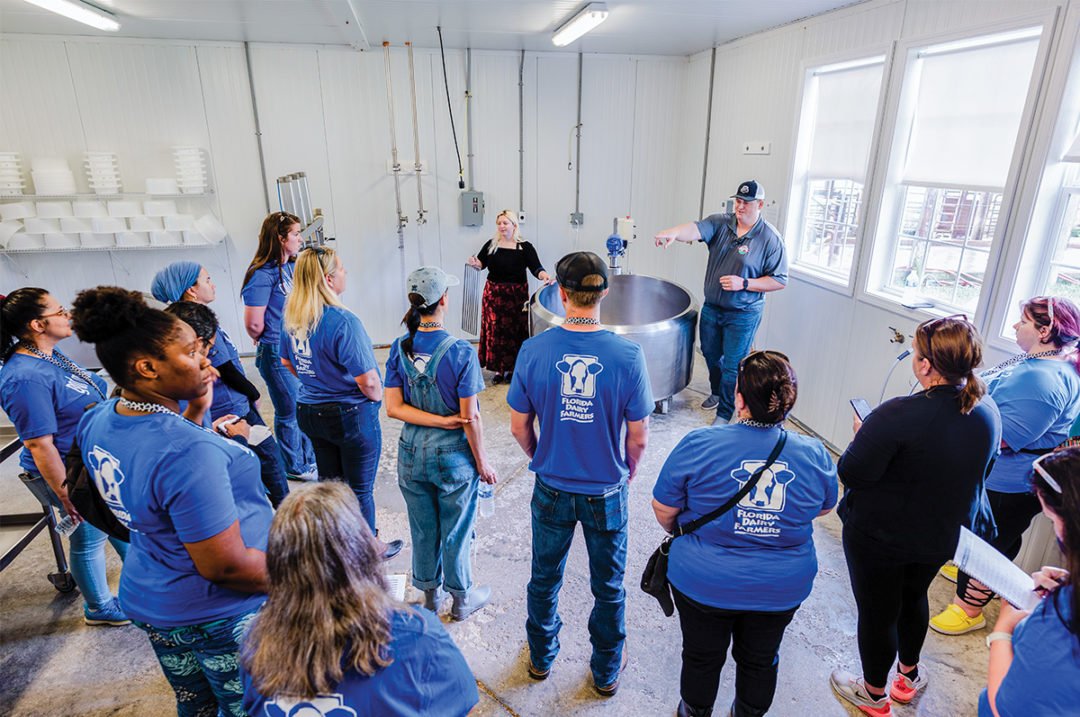I am not so far removed from my high school days – 11 years – that I cannot remember what was not taught to me and my classmates: ag education.
My school in Gainesville, Florida, had students who came from a farming background like me, but there certainly were a good share who probably thought milk just magically appeared at the grocery store. Even more disheartening were the times I heard someone repeating a myth about the dairy industry that was rooted in an activist group.
Too many people do not know the true story of dairy farming, and how hard my parents and I work each day to give that milk a starting point long before it hits the store shelf. This disconnection to agriculture and sustainable food production only grows as each generation becomes further removed from the true source of food. I cannot overstate how important it is that we work to bring more awareness to the dairy industry and agriculture as a whole and have it become part of the school day.
It is why I am so excited about an effort being led by National Dairy Council and state and regional checkoff teams (in partnership with the American Farm Bureau Foundation for Agriculture) to incorporate dairy into STEM (science, technology, engineering and mathematics) curriculum in schools across the country.
The program to inspire the specifics of this educational resource started last year at the best place possible: dairy farms. The Midwest Dairy checkoff team kicked it off by bringing educators from 15 states and Puerto Rico to visit dairies and other industry entities in Minnesota. They got to see just how much science, technology, engineering and mathematics play a role every day in our industry, which they are now using to write curriculum-aligned resources for teachers nationwide.
A similar tour played out here in Florida recently with about 30 science educators and curriculum directors making visits to three dairy farms. When the Dairy Council of Florida asked if we would host one of the stops, I was more than excited to accept the opportunity.
Our family shifted our business plan not long ago. We went from milking about 900 Holsteins to 200 Jerseys, and we opened a cheesemaking facility, somewhat of a rarity here in Florida. Our operation gave the educators a feel for the attention to detail it requires to turn raw milk into a finished product.

Kevin Lussier speaks with a science educator during a tour of his family's dairy farm in Florida. The tour was a part of the checkoff's efforts to connect science teachers and curriculum developers with farmers. Photo courtesy of Dairy Management Inc.
I have always enjoyed hosting tours and speaking to people about the dairy industry, but this visit was unlike any I have been part of before. Speaking to a group of science-minded experts opened the door to discovery and questions I do not usually get from the average visitor.
I have never taken such a deep dive into the pH levels of milk. Or explained how differences in cow feed can affect milk’s protein levels. Or how a shift in the number of days a cheese ages impacts its texture. Or spoken about the many different pathogen controls we have in place.
I welcomed every bit of it as I know their educational curiosity may very well open new doors for dairy. Three more checkoff organizations – Oregon Dairy and Nutrition Council, United Dairy Industry of Michigan and Dairy Farmers of Washington – will host tours just like ours in the coming weeks. I am excited to see even more states get involved with this effort and more science teachers and curriculum developers connecting with farmers. The STEM curriculum is expected to be implemented in several states by early 2024.
One of my Florida farming peers who also hosted the group described the STEM effort as “mission critical.” I could not agree more. As farmers, we know we are the small minority that feeds the vast majority, yet we largely go about our work unknown to the average consumer.
But more people – especially the younger generation – want to know the foods they eat come from a good place and that industries and farmers follow excellent animal care and environmental practices. This group – including many of today’s students – represent the parents of tomorrow who will be in the grocery store guiding how their family will eat.
So yes, it is critical we reach them now in new and creative ways. Bringing our many science-based proof points into the classroom through STEM curriculum is a great way of making that happen.
To learn more about your national dairy checkoff, visit the website or to reach us directly, send an email.
This article was written by Kevin Lussier, who dairy farms in Florida.






